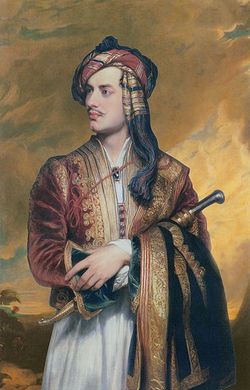Lord Byron
George Gordon Byron, 6th Baron Byron (January 22, 1788 - April 19, 1824), called Lord Byron, was an English romantic poet, known not only for his poetry, but also his very unconventional lifestyle and revolutionary attitude. The literary figure of the Byronic hero, marked by passion, talent and rebellion, pervades Byron's work and influenced later romantic poets. Due to his financial and personal engagement in the Greek War of Independence, Lord Byron is considered a national hero in Greece.
Among Byron's best known works are his short poems "She Walks in Beauty", "When We Two Parted, and "So, we'll go no more a roving". His longer, narrative poems "Childe Harold's Pilgrimage" and "Don Juan" also met with great success. In his time Byron was considered a major poet, although his reputation as a romantic poet has now diminished because he was not as innovative as some of his contemporaries. His lifestyle as an extravagant aristocrat, along with his excesses in the field of love and his accumulation of huge debts made him one of the most talked about and fascinating personalities of his time. Lady Caroline Lamb, a former lover, described him as "mad, bad and dangerous to know". In the Greek War of Independence Byron fought alongside the Greeks against the Ottoman Empire, which is why the Greeks honor him as a national hero.
Byron was an extremely prolific writer. In 1832 his publisher, John Murray, released Byron's complete works in 14 volumes in duodecimo, including a biography by Thomas Moore. Later editions were published in 17 volumes.
Although Byron's work is chronologically most commonly associated with romantic poetry, much of his earlier work has more affinity with the satiric tradition of Alexander Pope and John Dryden.
Works
- 1806 Fugitive Pieces published
- 1807 Poems on Various Occasions published, Hours of Idleness published
- 1809 English Bards and Scotch Reviewers anonymously published
- 1811 'Hints from Horace' and The Curse of Minerva written (unauthorized publication in 1815)
- 1812 Childe Harold's Pilgrimage, Cantos I and II published, The Waltz written
- 1813 The Giaour and The Bride of Abydos published
- 1814 The Corsair and Lara published; Ode to Napoleon Buonaparte anonymously published
- 1815 Hebrew Melodies published
- 1816 The Prisonar of Chillan, The Siege of Corinth, Parisina and Childe Harold's Pilgrimage Canto III published
- 1817 Manfred published
- 1818 Beppo and Childe Harold's Pilgrimage Canto IV published
- 1819 Prophecy of Dante written, Mazeppa and the Ode on Venice published, Don Juan Cantos I & II anonymously published
- 1821 Marino Faliero, Sardanapalus, The Two Foscari, Cain and Don Juan Cantos III - V published
- 1822 Vision of Judgement and Werner published
- 1823 Heaven and Earth, Age of Bronze, The Island and Don Juan Cantos VI–XIV published
- 1824 Don Juan Cantos XV–XVI published
External Links / Text Editions
- Fragment of a Novel(1816), by George Gordon (Lord Byron) http://www.sff.net/people/DoyleMacdonald/l_frag.htm
- Lord Byron's "Manfred" http://www.litgothic.com/Texts/manfred.html
- Lord Byron's "Child Harold's Pilgrimage" http://www.geocities.com/Athens/Delphi/7086/chpindex.htm
- Lord Byron's "Don Juan" http://www.geocities.com/Athens/Delphi/7086/donjuan.htm
- Letters and Journals
- Biography and Poems
External Links / Others
- Lord Byron's encounters with Percy Bysshe Shelley,Mary Godwin, and Claire Clairmont 1816-1821 http://www.harrys-stuff.com/byron/byron-shelley-diodati.php
- "Teaching the Truth about Byron's 'Vampyre' Letter", An essay by Jeffrey D. Hoeper *http://engphil.astate.edu/gallery/galignan.html
- The Life and Work of Lord Byron
- Biography
- The Lord Byron Ring
